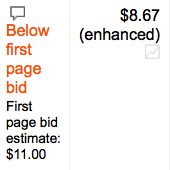Within the Google Interface there’s a super helpful piece of information called the First Page Bid Estimate. This metric tells you, based on both quality score and competition for the exact match of your keyword (even for broad and phrase keywords), an approximation of where you should set your bid to ensure that you win as many auctions as possible to appear on the first page of the search results.
If you want to see where Google thinks you should be bidding on your keywords you can opt into the First Page Bid Estimate column following the directions here. I’m sure you’ve also seen keyword statuses that say Below First Page Bid and then the estimated bid in there as well.

You can filter your keywords to see which of them are currently below the first page bid estimate, and then via editing in a table directly in the interface, you can select an option to prefill all CPCs to first page bid. You can even set up automated rules to ensure that your bids are on the first page and have that rule run every day to make sure you have top visibility. It makes it extremely easy to follow this estimate and fine tune your bidding strategy.
You probably know all of this already. And you should stop doing it.
I saw something in my account a while ago that forever changed how I viewed the Google first page estimate.

The Spookiest Thing This October
This keyword was in an ad group with a good impression share (higher than 70%), its bid was set at $17.00, its average CPC was only $7.11, its average position was 2.2. This keyword was on the first page. Google was telling me to change its bid to $100.00. It was terrifying.
Now I recognize that the estimated first page bid is only an estimate (it’s right there in the name). But this was a glitch in the matrix that I can’t ignore. It’s also a metric that directly influences the level of competition on keywords. So if something is calculated based on quality score and competition, but that thing itself directly influences the competition, it needs to be questioned.
I’ve looked into my accounts and the data isn’t as terrifying as I thought it might be. A small percentage of my keywords are below the estimated first page bid, and among that small percentage only a few are still displaying metrics of a keyword on the first page. But I’m also keeping a close watch on my keywords and adjusting my bids weekly to ensure that we’re in the average positions that we want to be, which is going to limit how much this happens.
My warning is based on some anecdotal evidence, but also on logic. If you are following Google’s recommendation, your competitors probably are too. And if you’re all using an automated function to raise your bids to first page, the competition gets that much stronger and your bids will all be raised together. Great for Google, bad for you. Are you relying too much on first page estimates? Don’t let Google take too much control of your bidding strategy.
It should be mentioned that Google openly acknowledges that their bids aren’t perfect (they say “meeting your first page bid estimate isn’t a guarantee of ad position”). But as they see it, not every estimated first page bid is high enough. The language contained within their help section focuses on making sure your ad appears, and the estimate allows you to see where your ad rank should be to appear as much as possible. If you aren’t appearing, they tell you to improve your ad rank. That can be done via diligent work on your quality scores, or it can be done the easy way by increasing your bids. I wonder which route most advertisers take.
There’s also the problem of figuring out just what qualifies as the first page for Google. According the AdWords help, 1-8 are generally considered first page, 9-16 are generally second page and on and on. Some searches will show 11 ads, but if your average position is 11 for a keyword you are almost guaranteed to be considered below the first page. I also can’t find any average positions below 11 in my accounts, so I’m not sure just how low they are willing to go across all industries.
Google’s changes to their results pages are on ongoing process, so just what is considered the first page will probably continue to be a bit of a moving target. Figure out what average positions work for you and take back control of your bidding strategy. Use the estimated first page bid as a recommendation, but don’t automate the process. I know that Google’s not perfect (as the $100 estimate burned forever into my brain), so I’m not going to let them tell me where my bids need to be.
This was the final post in our series about numbers that should be questioned in PPC. Check out our posts about AdWords and Analytics, Keyword Matching, Placement Fraud, Competition Metrics and Search Query Reports.
———-
Originally published in 2012 and updated by Cassie Oumedian, Associate Director of Services, Growth at Hanapin Marketing!




